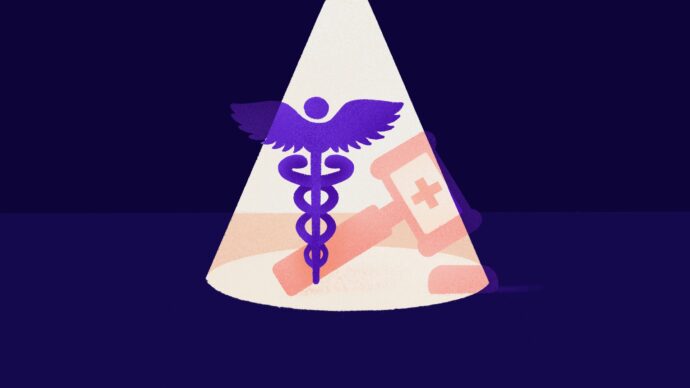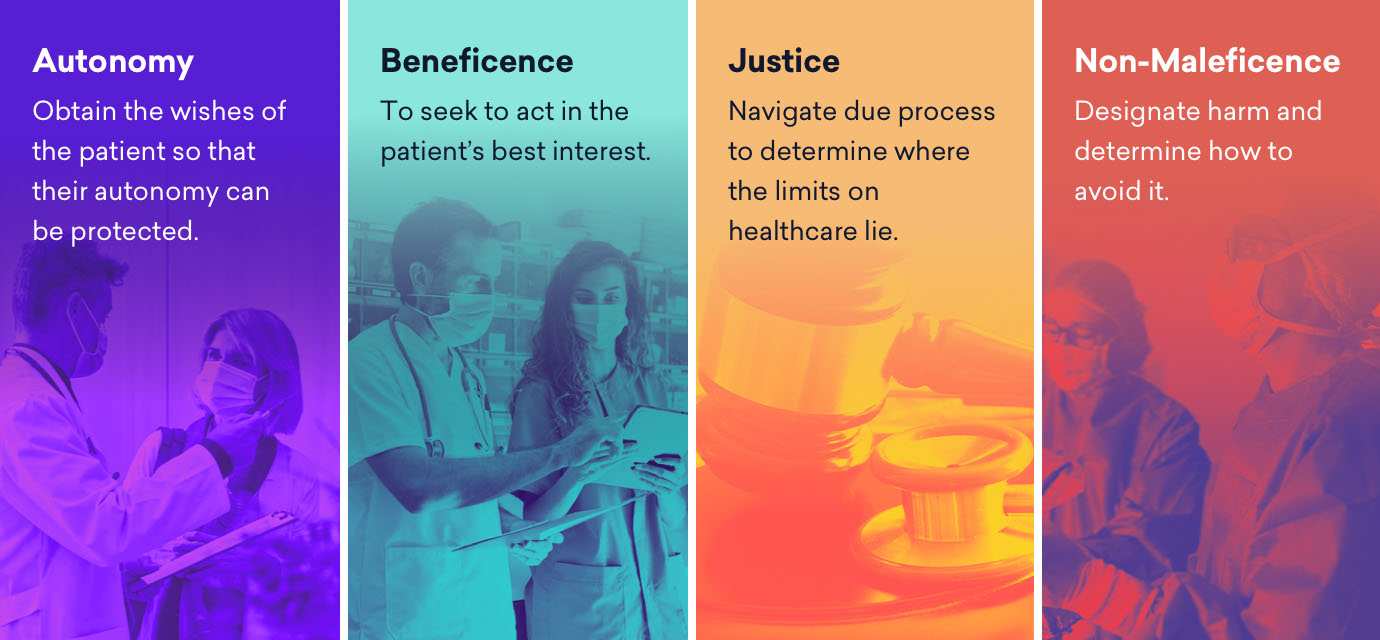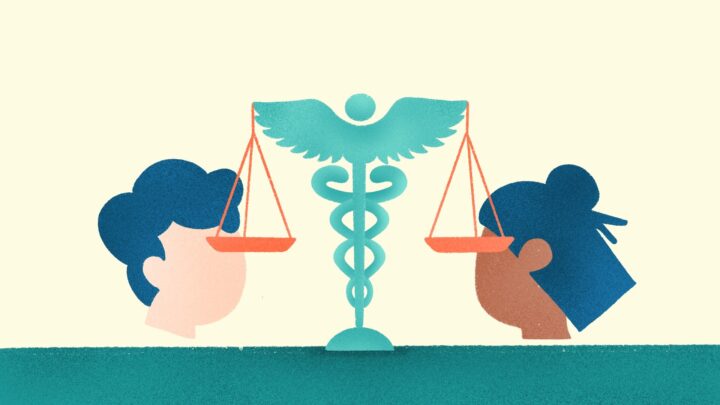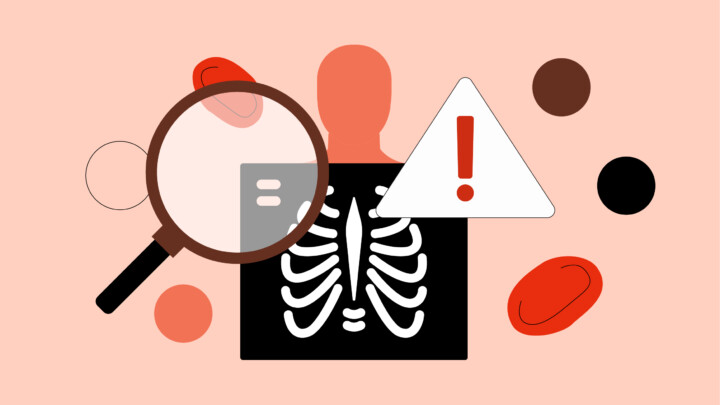
The first and most important maxim of the healthcare industry is Primum non nocere, or “First, do no harm.” It sounds simple enough, but the healthcare industry is complex, and everyone in this demanding field faces difficult choices daily. Understanding the various ethical challenges in healthcare will empower you to make more informed decisions that are better for patients and your own mental well-being. High ethical standards are a must for any healthcare professional, whether you are a doctor, nurse, or administrator. To help you navigate these standards, below is a summary of the most common legal and ethical issues in healthcare and how to handle ethical violations.
What are ethical issues in healthcare: 4 key principles
Ethical dilemmas relating to healthcare are a field of applied ethics concerned with the moral decision-making that medical staff must apply during medical practice. Moral and ethical values in medicine tend to vary based on the country and culture. Tom L. Beauchamp and James F. Childress have developed a standard approach or code of ethics to crucial topics in healthcare that holds true across borders and cultures. These guidelines for healthcare professionals help solve or avoid ethical dilemmas when medical moral principles are tested.

This ethical standards framework embraces four key principles of ethical decision-making within the healthcare industry.
- Autonomy – Obtain the wishes of the patient so that their autonomy can be protected.
- Beneficence – To seek to act in the patient’s best interest.
- Justice – Navigate due process to determine where the limits on healthcare lie.
- Non-maleficence – Designate harm and determine how to avoid it.
Healthcare organizations and practitioners must collaborate with patients to understand and balance their needs, human rights, and desires as human beings. For example, would it be against health practitioner’s code of ethics to provide a blood transfusion to a Jehovah’s Witness even if it would save their life?Modern healthcare is collaborative, and talking to patients is key to avoiding ethical violations in healthcare. Medical practitioners and public health officials should never make assumptions about a patient’s needs and desires. Ask for informed consent and follow safety protocols to ensure ethical principles are upheld.
Examples of ethical dilemmas in healthcare
Whenever a patient undergoes treatment, there are always medical ethical issues to negotiate. Issues with waiting lists, access to medical resources, and decisions on the correct course of treatment all pose ethical dilemmas. Take note: ethical is not the same as lawful. Something can be unethical but perfectly legal.

For example, if the emergency room is constantly backlogged, it’s not legally required for the healthcare facility or hospital administrators to speed up their work. On the other hand, it could be considered ethical to raise the matter with the hospital’s management team to find ways to help more patients, faster.
Some other examples of ethical issues in healthcare are the prioritization of treatment. Who needs immediate attention, and who should wait? Within organ donation, is it ethical to give a matching liver to an older patient who suffered from alcoholism when a younger patient would also benefit from that liver?
Ethical considerations in healthcare are complex, and sometimes even the right decision might not feel like the most ethical approach. It can be difficult to face ethical dilemmas especially in a life threatening emergency, but below we cover common examples, principles and best practices on how healthcare management, professional organizations and HCPs can maintain ethical behavior.
Most common ethical issues and standards in healthcare
The medical world is constantly evolving, and as medical technology changes, doctors are left with a host of new ethical issues. In a recent Sermo survey asking physicians the top medical implications they faced, the most common result was balancing patient care quality and efficiency. Ethical dilemma responses included:
- 21% Balancing care quality and efficiency
- 17% Allocating limited medications or tools of support
- 17% Addressing end-of-life issues
- 15% Addressing access to care
- 15% Doctor and patient confidentiality
- 13% Allocating limited donor organs
When asked what other top ethical issues and ethical considerations physicians face in medicine, responses included:
Insurance dictating medical care. Insurance companies delaying or denying surgeries.
Neurosurgery, U.S.
You cannot report to the ones who may actually be getting paid to be the underlying cause of the problem.
Internal Medicine, U.S.
Overcoming an ethical dilemma in medicine isn’t black and white, as is the case with lawful/unlawful actions. Let’s examine some of the key medical ethical considerations facing healthcare providers and staff today.
1. Patient confidentiality
One of the biggest legal and ethical issues in healthcare is patient privacy and confidentiality. This is why 15% of survey respondents noted that doctor-patient confidentiality is their top ethical issue in practicing medicine. Healthcare providers and employees have an obligation to secure and protect the privacy of all patient medical records and health information. Under the Health Insurance Portability and Accountability Act (HIPAA), violations of patient privacy could lead to suspension and termination.
Yet, there are gray areas, which can inadvertently lead to ethical violations in healthcare. That is why it is vital to study ethics and instead of avoiding ethical dilemmas, confront them with empirical knowledge and sound ethical principles. For example, would it cause more harm than good to withhold aspects of a patient’s medical condition? Likewise, the opposite could be true depending on your personal beliefs and professional life experiences.
For more information on patient confidentiality in health information, see this deep dive into patient confidentiality in healthcare.
2. Informed consent
1 in 4 surveyed physicians say informed consent is a top ethical concern. It is a cornerstone of ethical healthcare, ensuring that patients understand their medical condition, proposed treatments, potential risks and benefits, and alternative options before making autonomous decisions. However, ethical issues surrounding informed consent frequently arise. Challenges can include a patient’s capacity to give informed consent, particularly in cases of cognitive impairment, severe illness, or when dealing with minors. Language barriers or cultural differences can also complicate the process, making it difficult to convey information effectively and ensure true understanding. For instance, if a doctor uses highly technical medical jargon without adequate explanation, a patient may sign a consent form without fully grasping the implications of their treatment, thus compromising their autonomy and potentially leading to suboptimal patient outcomes.
Another example of ethical issues in healthcare related to informed consent involves situations where a patient’s family or caregivers attempt to override their wishes, or when there’s pressure from medical professionals to choose a specific treatment path. Balancing the principle of beneficence (acting in the patient’s best interest) with the patient’s right to self-determination requires careful ethical decision-making. Healthcare providers must ensure that informed consent is an ongoing dialogue, not a one-time event, allowing for continuous patient education and clarification to uphold the highest ethical standards in medical practice.
3. Physician-assisted suicide (PAS) and euthanasia
Physician-assisted suicide (PAS) and euthanasia are among the most contentious ethical issues in healthcare, sparking intense debate across medical, legal, and moral landscapes, with roughly 60% of physicians voting in support of PAS and 40% opposed. The ethical dilemma arises from the conflict between a patient’s autonomy and right to self-determination at the end of life, and the medical profession’s foundational principle of “do no harm” (non-maleficence) and preserving life. While some argue that allowing a terminally ill patient to choose the timing and manner of their death respects their dignity and alleviates suffering, opponents express concerns about potential abuses, the sanctity of life, the impact on the doctor-patient relationship, and the role of healthcare providers in facilitating death.
The complexity of PAS ethical considerations is further amplified by factors such as a patient’s mental capacity, potential coercion, the availability of palliative care alternatives, and differing religious and cultural beliefs. Navigating these sensitive end-of-life issues requires careful attention to informed consent, ensuring that the patient’s decision is voluntary, well-considered, and free from external pressure. Currently, 18 jurisdictions globally have legalized assisted dying practices, including euthanasia and/or physician-assisted suicide. As more jurisdictions consider or legalize PAS, healthcare organizations and professionals face the ongoing challenge of developing clear guidelines and ethical frameworks that balance compassion, individual rights, and the core values of medicine, all while addressing the profound moral and practical implications for patient care.
4. Improving access to healthcare
According to figures from the United States Census Bureau, 294.6 million people had health insurance in 2017, a record high. Despite this, one in five U.S. adults decided not to seek healthcare services in 2017 because they had no medical insurance. The soaring cost of both healthcare and associated insurance policies leads to ethical dilemmas, which is why 15% of Sermo survey participants highlighted this as their top ethical issue. And it’s not just costs that conflict with patent access to care.
Is it ethical to reject someone who needs medical treatment based on their insurance status? Is it ethical for hospitals or some healthcare providers to charge so much for treatment? Strikes might disrupt patient care and create ethical dilemmas that many healthcare professionals feel uncomfortable with. This is not only an ethical issue in medicine, but it’s a discussion often taken up in politics regarding how society wants to operate its healthcare system. It’s a debate that has raged for decades in the U.S., with no end in sight. Politically, the U.S. will see this as the defining ethical issue of our time, with profitability vs. public health coming into direct conflict, especially with high-cost and life-altering treatments like cancer care. More recently, government regulations in the U.S. have restricted access to women’s reproductive healthcare, a contentious situation for many Americans.

5. Balancing care quality and efficiency
Maintaining a high quality of care while simultaneously striving for efficiency is a significant ethical challenge, as noted by 21% of surveyed physicians. This delicate balance often requires healthcare providers to make difficult decisions that impact patient well-being and resource allocation. For instance, a hospital might face pressure to reduce patient wait times, which could lead to shorter appointments or less thorough examinations. This prioritization of efficiency can raise ethical questions about whether the standard of care is being compromised for the sake of speed.
The ethical dilemma deepens when considering the financial pressures on healthcare systems. Cutting costs can be beneficial if executed thoughtfully. But without careful planning, it risks undermining care quality, staff morale, and patient outcomes. Decisions about staffing levels, the adoption of new technologies, or the duration of patient stays can all be influenced by a desire for efficiency, potentially leading to a trade-off with optimal outcomes. Navigating these ethical issues requires a commitment to patient-centered care and a careful consideration of how efficiency initiatives impact moral decision-making and the overall ethical standards of the medical profession.
6. Do-Not-Resuscitate (DNR) orders
DNR orders have always been a controversial medical ethical dilemma, as shown by the 17% of survey respondents claiming end-of-life issues as the top ethical issue they face. This order instructs any healthcare workers or providers not to perform cardiopulmonary resuscitation (CPR) if the patient’s heart stops beating or they stop breathing. These orders may only be written in consultation with a physician and a patient. Yet one ethical issue in healthcare is what happens when a patient clearly displays a DNR order?
In 2017, one Florida man had a DNR order tattooed across his chest. Although the seriousness of the tattoo was questioned, the man could not breathe and could not talk, so the ICU unit decided to honor the message and opted not to initiate CPR. Such ethical and moral dilemmas are tough to handle for all healthcare providers and staff. From an ethical standpoint, DNR orders must balance the degree of pain involved in treatment when compared to the potential benefits. As a result, addressing end-of-life issues can be one of the major healthcare challenges for medical doctors and healthcare organizations. For more information about DNR orders and resolving ethical issues according to the code of ethics while avoiding legal issues and negative consequences, check out this resource.

7. Allocating limited donor organs and resources
13% of Sermo’s survey respondents felt that allocating limited donor organs is the top ethical issue in healthcare, while 17% felt the same way about medication and tools. And it’s not surprising considering that in the United States, more than 95% of North Americans are in favor of being an organ donor, but only 58% are actually registered donors. There are 105,000 individuals currently waiting for organ transplants nationwide; however, in 2024, there were 17,000 deceased donors and over 7,000 living donor transplants. Living donors most commonly donate a kidney or a portion of the liver.
This is why research on the ethical considerations of limited donor organs is very important in order to increase the number of living donors. For more information on ethical issues in organ donation, read ethical principles in the allocation of human organs.
Additionally, medications and tools can be difficult ethical issues to manage. Medication is the most common way to cure a disease. Plus, acutely acting medications are used as adjunctive therapy to a primary treatment method (e.g., surgery). However, a growing number of medications are in limited supply, meaning not all patients receive the medication they need, leading to moral conflict.
The most common legal issues physicians face
While often intertwined, legal and ethical issues in healthcare possess distinct characteristics. Legal issues are typically codified into laws and regulations, with clear penalties for non-compliance. Ethical issues, on the other hand, pertain to moral principles and values, guiding decisions that may not be legally mandated but are considered morally right.
For instance, a physician’s obligation to maintain patient confidentiality is both a legal requirement under HIPAA and an ethical imperative. However, a decision about withdrawing life support from a patient, while legally permissible under certain circumstances, often involves profound ethical considerations regarding the patient’s autonomy and quality of life.
Physicians on Sermo identified the following as the most common legal issues they may face:
- Healthcare system malpractice (38%)
- Emerging telemedicine laws (19%)
- False claims (16%)
- Antitrust issues (15%)
- HIPAA compliance (12%).
Healthcare operates within strict legal frameworks, influencing everything from patient care to administration. Compliance is crucial for patient safety, institutional integrity, and system sustainability. Professionals must understand these legalities to avoid severe penalties, reputational damage, and loss of license.
In a recent Sermo poll, a staggering 91% of physicians said that they believe current healthcare laws need to be revised. Many laws and regulations in healthcare were established before the emergence of new technologies and care delivery models, leading to gaps and gray areas. The continuous evolution of medical technology, treatment modalities, and societal values necessitates frequent re-evaluation of healthcare laws.
Antitrust issues and ACOs
Accountable Care Organizations (ACOs) are designed to improve patient care coordination and reduce healthcare costs. For individual physicians, participation in an ACO involves collaborating with other healthcare providers. While this collaboration offers benefits for patients, it can also raise antitrust concerns if it’s perceived as reducing competition or fixing prices within the market. This means that physicians face potential liability, as their participation could lead to legal challenges under antitrust laws if the ACO’s actions are deemed anticompetitive, even without intent to violate the law.
For example, an ACO that includes most specialists in a given area and begins dictating prices could be seen as limiting patient choice and increasing costs, potentially exposing participating physicians to liability. Therefore, it is crucial for physicians to seek legal counsel before joining an ACO to understand potential antitrust risks and ensure compliance. Both the physicians and the ACO must comply with antitrust laws concerning market share, exclusive contracts, and competitor collaboration. Furthermore, the ACO and its participants should regularly monitor operations, including market share analysis and contract terms, to identify and address any potential antitrust risks.
False claims and whistle-blower suits
The False Claims Act (FCA) is a powerful tool used to combat fraud against government healthcare programs like Medicare and Medicaid. Whistle-blowers, often current or former employees, can file qui tam lawsuits on behalf of the government, exposing fraudulent billing practices, kickbacks, and other illicit activities. If the government intervenes and wins the case, the whistle-blower is entitled to a percentage of the recovered funds. A common case involves upcoding, where providers bill for a more expensive service than was actually performed. A high-profile example of this was the $25 million settlement by CareAll Management LLC, a Tennessee-based home health provider. CareAll was accused of submitting false claims to Medicare and Medicaid by exaggerating the severity of patients’ conditions and billing for medically unnecessary services to increase reimbursement.
Healthcare system malpractice
Medical malpractice remains a significant legal concern for healthcare providers and institutions. It occurs when a healthcare professional’s negligence leads to patient injury or death. The leading cause of medical malpractice claims is diagnostic errors, which account for approximately 33% of all malpractice allegations. Diagnostic errors, including failure to diagnose, delayed diagnosis, and misdiagnosis, consistently top the list of claims, followed by surgery-related errors (23%) and treatment errors (18%).
Proving malpractice often requires demonstrating a deviation from the accepted standard of care. For example, a surgeon leaving a foreign object inside a patient during surgery is a clear case of malpractice; others include ignoring professional standards and negligent post-operative care.
Emerging telemedicine laws
The COVID-19 pandemic accelerated the adoption of telemedicine, but the legal framework is still catching up. Key challenges include licensure across state or country lines, reimbursement policies, and patient information security for virtual consultations. While many states and countries temporarily waived licensing requirements during the pandemic, long-term regulations for physicians treating patients in different geographical locations are still being developed.
Ensuring the secure transmission of patient privacy data during virtual visits is paramount to comply with HIPAA and other privacy regulations and to avoid any future legal issues. For instance, if a physician licensed only in California provides a virtual consultation to a patient located in Texas, where they are not licensed, they could be subject to legal action in Texas for unlicensed practice, even if the care provided was appropriate.
The Health Insurance Portability and Accountability Act
HIPAA sets national standards for protecting sensitive patient health information (PHI). Non-compliance can result in substantial fines and even criminal charges. Practicing physicians must implement robust security measures to protect electronic PHI, conduct regular risk assessments, and train their staff on HIPAA protocols. Common violations include unauthorized access to patient records, improper disposal of patient information, and breaches due to cyberattacks.
The U.S. Department of Health and Human Services (HHS) Office for Civil Rights (OCR) has increased enforcement, with fines now ranging from $13,785 to $63,973 per violation and annual caps reaching $2 million for the most severe cases involving willful neglect that is not corrected promptly. Excellus Health Plan faced a $5.1 million penalty in 2021 for HIPAA violations related to the Right of Access, one of the largest fines in recent years, illustrating OCR’s focus on patient access to their medical records.
Licensing and credentialing
Maintaining proper licensing and credentialing is fundamental for all healthcare professionals. This involves verifying a practitioner’s qualifications, education, training, and experience. Errors or omissions in this process can result in serious legal repercussions, including disciplinary actions by state medical boards and the loss of privileges. As a practicing physician, maintaining up-to-date licensing and credentialing is not just a formality—it’s a legal safeguard. Credentialing verifies your qualifications, training, and professional history, and any lapse or inaccuracy can lead to serious consequences. Practicing with an expired license, outdated certifications, or incomplete documentation can expose you to disciplinary actions from state medical boards, malpractice liability, or even loss of hospital privileges. In some cases, billing for services without proper credentials may also lead to insurance fraud allegations. To protect your career and reputation, it’s essential to proactively track renewal dates and ensure that your credentials are current and fully verifiable.
How to handle ethical risks and violations in healthcare
Moral dilemmas and ethical issues place a burden on doctors, nurses and administrative staff. 47% of physicians on Sermo have faced ethical dilemmas in their own practice. When asked, “How do you reduce ethics risks in your practice?” Sermo members identified strategies such as building a culture of integrity (31%), accurately assessing needs/resources of patients (31%), creating a strong foundation of support (22%), and establishing a values focused approach (16%).
Accurately assess the needs and resources of patients
Effectively assessing patient needs and resources requires physicians to balance empathetic communication with professional boundaries. Understanding socioeconomic factors is vital for care, but intrusive questioning on personal finances should be avoided unless clinically necessary. Physicians must respectfully gather essential information to ensure patients feel heard, not interrogated.
Maintaining boundaries also involves managing expectations around resources amidst healthcare disparities. Physicians advocate for patients, but must also acknowledge healthcare system constraints, leading to ethical dilemmas like addressing access to care (according to 15% of surveyed physicians) or allocating limited resources (as voted by 17% of survey respondents). Transparent communication of treatment limitations, exploring options based on peer-reviewed evidence, and avoiding false promises are key to building trust and maintaining professional integrity.
Create a strong foundation of support
Building a strong foundation of support is crucial for physicians to navigate the inherent ethical complexities of healthcare. This support can come from various sources, including colleagues, superiors, and internal hospital resources. 29% of surveyed physicians reported finding support for ethical dilemmas from their colleagues, highlighting the importance of peer networks.
30% of physicians sought help from professional superiors, indicating the value of strong leadership and mentorship in addressing ethical challenges. Establishing clear communication channels and fostering a culture of open dialogue within healthcare organizations can empower physicians to discuss ethical concerns without fear of reprisal. This is particularly relevant with trending news showcasing increased physician burnout and mental health struggles, underscoring the need for robust support systems beyond just individual resilience.
Build a culture of integrity
Building integrity in healthcare is crucial for patient safety and trust. Key pillars include open, protected reporting mechanisms (like hotlines) for concerns and mistakes, comprehensive ethics training with real-world cases (beyond basic compliance), and consistent ethical communication and modeling from leadership. In an era of medical fraud, data breaches, and conflicts of interest, a strong integrity culture is a vital defense, rebuilding patient trust.
How should physicians handle the reporting of ethical issues while maintaining personal and professional boundaries and maintaining a culture of integrity? A Sermo survey provided these insights.
- 36% Report the conduct to appropriate clinical authorities, such as the peer review body of the hospital, or the local or state medical society
- 22% Protect the privacy of the patient
- 16% Report the suspected violation to the appropriate authorities
- 14% Confront the people who are involved in the ethical violation
- 10% Report the conduct directly to the state licensing board
Transparency and accountability are paramount. This means encouraging honest error disclosure and learning, moving from a “blame culture” to an “acceptance culture” where mistakes are learning opportunities. When professionals feel secure enough to voice concerns, challenges, and vulnerabilities, it can improve patient outcomes and reduce burnout.
Establish a values-focused approach
A values-focused approach integrates the core principles of healthcare ethics—autonomy, beneficence, non-maleficence, and justice—into every aspect of practice. This involves not only understanding these principles theoretically but actively applying them in daily decision-making, from individual patient interactions to broader organizational policies. By prioritizing these foundational values, healthcare providers and organizations can foster a culture where ethical considerations are central, guiding choices about patient care, resource allocation, and professional conduct, thereby strengthening trust and promoting the well-being of all stakeholders.
Here is a step-by-step example of how to address ethical violations at your practice. Firstly, acknowledge and investigate the potential ethical issue. Bring together different disciplines and create an environment where people are allowed to and feel comfortable speaking up, regardless of their seniority or primary responsibility, while respecting professional boundaries.
Next, an ethical violation should be categorized as either a process issue or a regulatory issue. Remember, something can still be an unethical behavior even if it happens to be perfectly legal. For example, when a parent refuses to support a patient’s wishes, what is the clinic or hospital’s policy on the right way forward?
Here are more nuanced examples of ethics management strategies used by healthcare providers:
- Provide regular refreshers on ASHA’s Code of Ethics and data privacy best practices.
- Break silos and allow for different staff members to come together to discuss the issue.
- Establish a clear chain of command for when ethical issues need to be escalated or when group decision making is required.
- Create an environment where the patient’s wishes are prioritized. This includes informed consent, reviewing questionable medication orders and involving family members when appropriate.
- Employ ethics experts to work alongside medical teams or create ethics committees to review the decision-making process, patient rights, moral norms and moral rights, regarding the particular case.
Healthcare providers should adhere to professional standards and guidelines to ensure the delivery of high-quality care, patient safety, and ethical practices. These standards are essential for maintaining the trust and confidence of patients, families, and the broader community. While ethical theories may vary by country and healthcare setting, here are some common professional standards that should be implemented in healthcare companies:
- Clinical care standards:
- Adherence to evidence-based guidelines for diagnosis, treatment, and care.
- Continual monitoring and improvement of clinical outcomes.
- Prompt pain management and symptom control.
- Commitment to infection control and prevention measures.
- Patient-centered care:
- Respect for patient’s autonomy and involvement in decision-making.
- Timely and effective communication with patients and their families.
- Cultural competence and sensitivity to diverse patient populations.
- Compassionate and empathetic patient care in tandem with ethical obligations.
- Safety standards:
- Implementation of patient safety protocols, including medication reconciliation and patient identification procedures.
- Reporting and investigation of adverse events or near misses.
- Reduction of healthcare-associated infections and other preventable harm.
- Effective management of medical errors and disclosure when they occur.
- Ethical standards:
- Adherence to ethical principles, such as beneficence, non-maleficence, autonomy, and justice.
- Protection of patient information, patient confidentiality and privacy.
- Informed consent processes for treatments, procedures, and research.
- Resolution of ethical dilemmas through consultation with ethics committees when necessary.
- Continuing education and competence:
- Ongoing professional development for healthcare providers and co workers.
- Maintenance of licensure and certification requirements.
- Monitoring of healthcare professionals’ competence and performance to avoid harm.
- Documentation and record-keeping:
- Accurate and complete documentation of patient care as well as any follow up visit.
- Timely entry of patient information and health care providers into electronic health records (EHRs).
- Protection of patient records and compliance with data privacy regulations.
- Collaboration and teamwork:
- Effective interdisciplinary collaboration among healthcare professionals.
- Clear and open patient treatment communication and moral conflict among team members.
- Encouragement of a culture of mutual respect and group decision-making.
- Resource utilization and efficiency:
- Responsible use of healthcare resources, including diagnostic tests and treatments.
- Efforts to minimize healthcare waste.
- Monitoring and control of healthcare costs while maintaining quality care to promote health.
- Patient and family education:
- Providing patients and their families with information about their conditions, treatment options, and self-care.
- Supporting patients in making informed decisions about their health care.
- Quality improvement:
- Regular assessment of healthcare services and processes.
- Implementation of quality improvement initiatives to enhance patient outcomes and safety.
- Measurement and reporting of performance metrics.
There’s no getting around it: ethical issues will happen. What matters is that as part of a patient-centered care system, ethics are at the forefront.
By creating and maintaining a code of ethics, due process, safety protocols and the appropriate person responsible for handling the ethical dilemma, healthcare professionals can successfully manage potential ethical issues.
Conclusion
Navigating the legal and ethical dimensions of healthcare can be daunting. But, there’s no reason to suffer alone. As this article has highlighted, ethical principles such as autonomy and beneficence serve as fundamental guides for patient care, while common dilemmas, including resource limitations, end-of-life decisions, and patient confidentiality, frequently test these principles. Ultimately, clear and honest communication is key to navigating these complex situations and maintaining ethical practice.
Get guidance on confronting specific healthcare challenges or ask for support in navigating ethical dilemmas and ethical issues in healthcare from doctors who have faced similar situations. Enter the virtual doctor’s lounge and explore opinions from over 1 million doctors across 150 countries.
Sermo is the world leader in bringing together expertise, personal experience, and cases from the frontline, all in one place. Join the world’s largest physician-first online community and get access to paid surveys for doctors by claiming your complimentary Sermo membership now.















